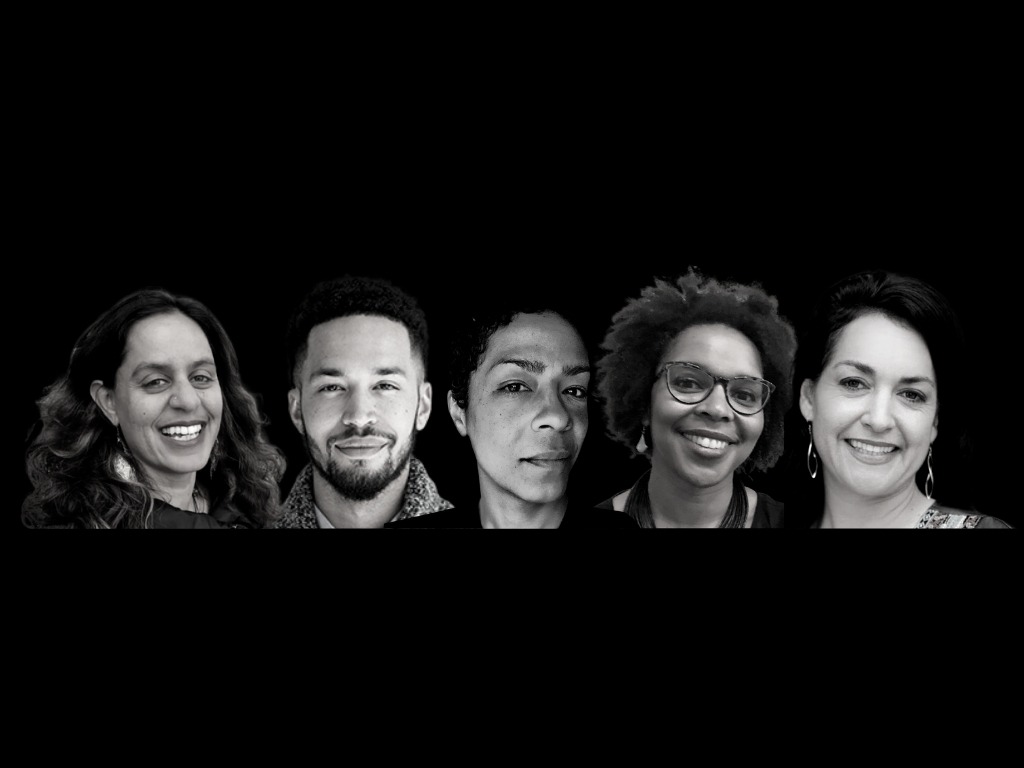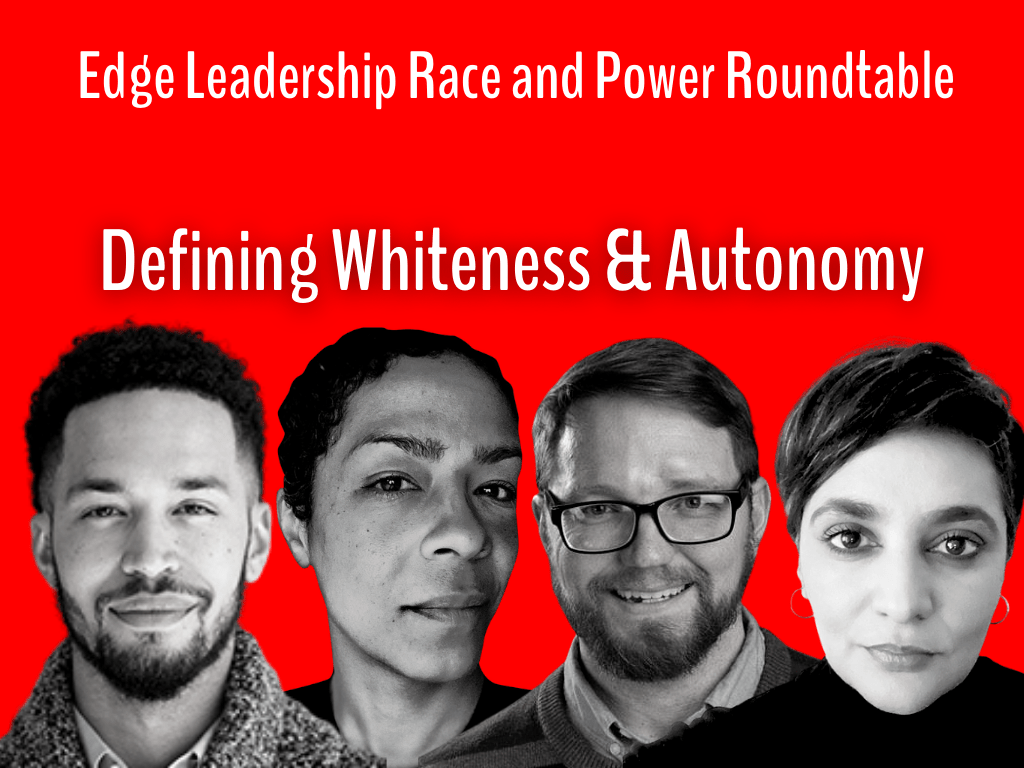Edge Leadership hosted a Race and Power Roundtable. In this clip, Anastasia Tomkin, Kelly Bates, and Cyndi Suarez discuss what it might take to push forward the global conversation on race, how movements can unite, and where change is occurring.
Anastasia Tomkin: Sometimes, I put myself in the shoes of people back in the days of slavery, the enslaved, and how brave they had to be to organize and to push people to actually fight that. Then, even closer, in the days of segregation, masses of people followed “Whites Only/Colored Only” signs for years. Were there moments in time when people were like, “Hey, we should actually do this,” and then some kind of fear held them back, some kind of idea that, “No, this is the power, this is how it is. We can’t do that, we can’t bridge this gap, it’s impossible, it’s dangerous”? But then, eventually it did happen, and there were the sit-ins and stuff like that. And I think once again, we’re back in a moment where we have the power to push this forward. And a lot of us are comfortable, and I think we have been roused from that comfort, but I’m always like, the amount of sacrifice it took for them to get where we are now…what are we currently willing to sacrifice?
You know, I’m not the type, I’ll admit, to go to a lot of protests. I’m kind of wondering about the efficiency, or the efficacy, of protests in this day and age. I think it has done a lot. But I just feel like we need to figure out new creative ways of fighting this, especially because the amount of violence that can meet you at those protests, I mean, it’s so risky.
Kelly Bates: Many of us have been in conversations for years about, “Can we start to develop a framework and a lens where we look at racism globally?” Because of the way the world is so deeply connected now—through the pandemic, through the rise of authoritarian regimes, and conservatism finding its way in different places we didn’t imagine it to be around the world, and, frankly, seeing African nations and others standing stronger than ever in this moment, I feel like we have the opportunity to frankly be in conversation with people from all over the world and each continent to talk about, how do we help people understand what’s happening in the context of global racism and colonialism? Where did that start? Where is it different contextually, but also what holds us together around that? So that the whole world is thinking about this, and that we’re breaking down deeply the barriers of the color line, which impacts every society. You know, even in Haiti, in my husband’s home country, the skin color line is so pronounced, right, in who has power and who doesn’t. I mean, there’s a reason for that; there’s an origin. And having some constructs and tools so we can teach people about this throughout the world, you know, not just classrooms, but practitioners and people, just to understand this on a broader level. I think we’re ready for that.
I truly believe The Squad in the United States of Black women and women of color who are gaining ascendancy and progressive power, that squad is going to be 100 deep in five years, guaranteed. Guaranteed. That Squad number’s going up, and we will be president. There will be—my prediction is that there will be a more progressive president, and it will be a woman of color in the next 20, 25 years, maybe less. And so, what are we doing to get ourselves ready for that backlash that could come when that occurs, and how do we set the stage for that?
Sign up for our free newsletters
Subscribe to NPQ's newsletters to have our top stories delivered directly to your inbox.
By signing up, you agree to our privacy policy and terms of use, and to receive messages from NPQ and our partners.
And then lastly, I hope where we’re going is some honest, internal, real critique and conversations. I think we had to…unify BIPOC communities and GLBTQ communities, etc., etc. But I feel like we’ve jumped over some deep conversations we need to have with each other. Even the strategy around Defund the Police, right now, a lot of people really want to talk honestly about, “Is that the frame we still want to use?” Obviously it worked on some levels, but how do we really want to think about this? And I want to think differently about security. I want to transform it, but I want them a part of it, and that’s not something I would have ever imagined three months ago.
Black folks have—and I put myself in that category, I’m Black and Irish—we have our agenda we’re trying to materialize, and we’re being centered, and then I think there’s…because we’ve had to unify so much, we haven’t been able to figure out some of the unique things that we need to be working toward and addressing some of the real challenges between each other as BIPOC folks that we had to kind of put aside, or we wrestle with sometimes but we come back to it, because we’ve got so much that we’re up against. And I’m hoping, you know, I trust people like Cyndi and others, there are people who can hold those conversations, you know? But I don’t think they can happen in isolation. I don’t think they can just happen inside one organization or one network. We need the safety of many, I think, to have that kind of conversation.
Cyndi Suarez: Wow, thanks, Kelly. That’s so deep, a lot of stuff you said. In my study of civil society, which is actually what NPQ’s mission is—it’s not nonprofit management, which is what it’s known for and I think what it’s done—and so a lot of what we’re doing is looking at, you know, at the right time, civil society. Because that work maybe at one time was led by nonprofits, but now has so many different players, like movements and just different folks.
And when I started to look at that, because we get a lot of readers from across different parts of the world—Africa, India, Canada, Europe are the most—I get a lot of readers that write me about what we write, and one of the things that I noticed by looking at Latin America, just initially, really quickly around civil society is that their whole democracy was based off of coming off colonialism. So, it starts off at a different place than ours does, right? And then if you look at, when I started to look to Africa, I couldn’t even wrap my mind around it. Because theirs comes from looking at colonialism, but also Black sovereignty in some places, right? And I know it may not be “perfect,” because I know I’ve heard critiques, but for example, Rwanda, you know, their constitution, after the big war, their biggest crime is inequality, right? And everyone’s like, “Oh, yeah, they’re not doing it right. It’s not working that well.” But they’re trying, right? And they organized their whole sort of constitution based on that, and how money flows through taxes is based on equity. So, you know, we’re not even talking about that, you know? They’re doing it.
Edge Leadership began in 2020 with a series of in-person and online convenings. This article and multimedia story series features the thinking of Edge Leaders. Follow these talented, sector-crossing, forward thinking social change agents at @EdgeLeadership2020 on Instagram, via NPQ’s channels, and by joining our online platform experiment.











